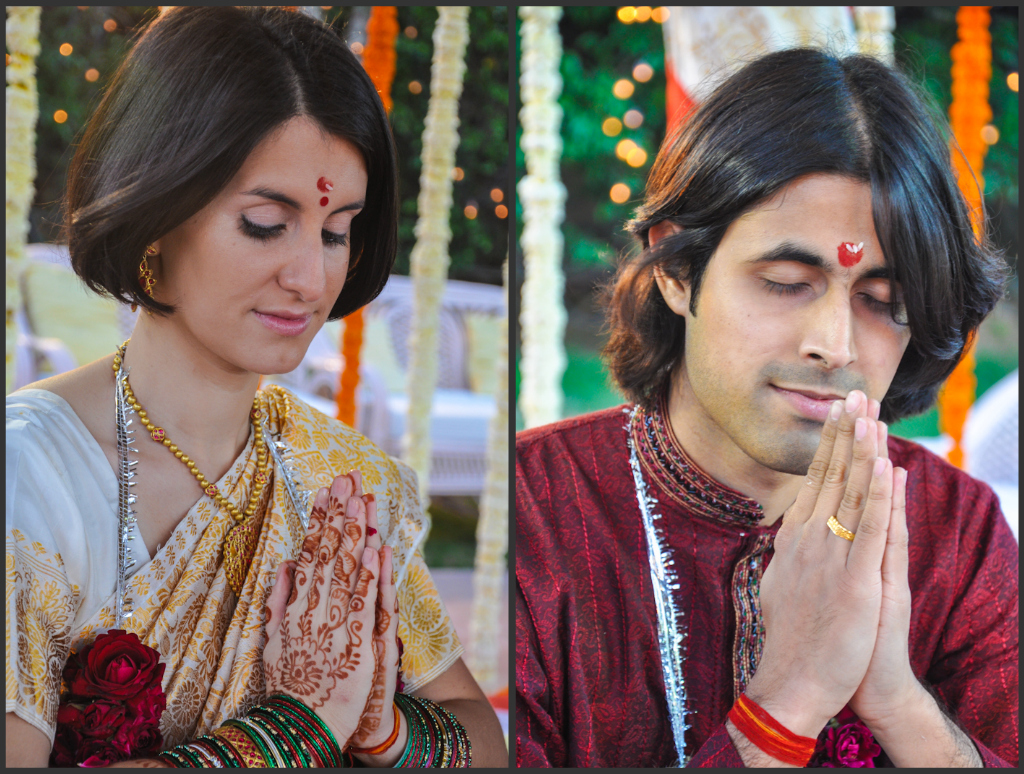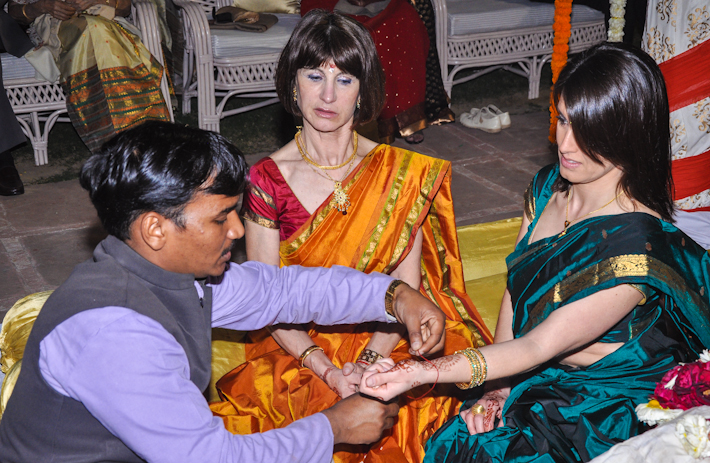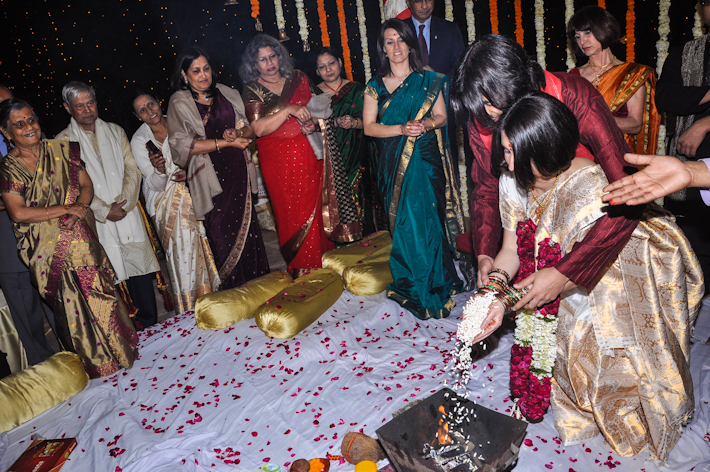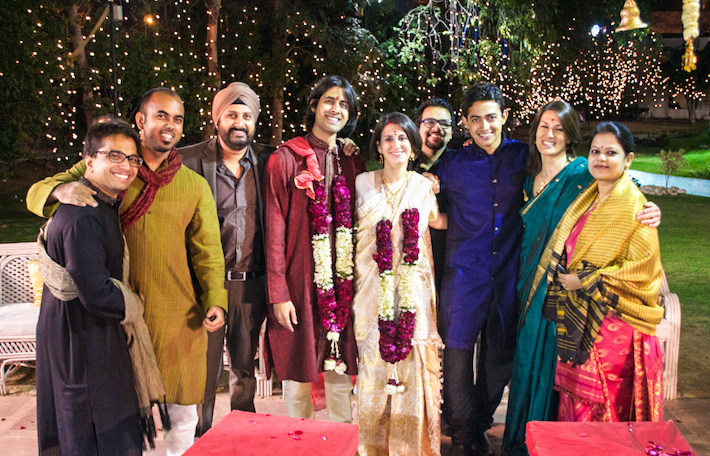If you’ve read about our families meeting, our friends arriving to India and our alternative bachelor(ette) party, now it’s the time to give you an inside on our actual wedding day!
Ashray and I come from different sides of the world. Although none of us is religious, we followed the family tradition and had a “proper” Indian wedding. As I am not a Hindu, we couldn’t have a Hindu wedding as such, but instead opted to do an Arya Samaj ceremony.
Now, what on earth is Arya Samaj? You must be wondering!… It is a Hindu reform movement, or as I often call it when I try to explain to those who are not familiar, “is a modern version of Hinduism”. I know calling it “modern” might be a bit controversial, but as Arya Samaj allows marriages between people of different castes and even religions, I do see it as more modern. Furthermore, dowries (the sums that [traditionally] the bride’s family pays to the groom’s family to finalize the union) are not observed and the wedding ceremonies are shorter and much more affordable than a traditional affair that can easily last for 5 or 7 hours. Another Arya Samaj plus (although it might seem almost ridiculous in the international context) is that couples can get married without the consent of their parents – not that we needed that. In a country where arranged marriages are the norm and love is not always celebrated, this makes it easier for lovers to wed, as long as they are of legal age to do so. So if in your country you can just get married to whoever you want to, think that in some parts of the world that is actually a privilege, not a given freedom.
Many people ask me:
what did your wedding ceremony consist on?
So I thought I’d invite you for this special evening, and take you through the ceremony step by step with this photo story:
The wedding takes place under a mandap, a colorful structure beautifully decorated with fabrics and hanging flowers, where this kind of ceremony traditionally takes place.
The ceremony starts with the pandit (priest) throwing some holy water at us (common as a starter of many prayers in Hinduism).
After that, bride and groom exchange flower garlands while guests throw flower petals: the bride garlands the groom first. This symbolizes the public acceptance for each other – as if people weren’t sure yet that we’re meant to be! ;)
We take a family portrait and we’re ready to start the main part of the ceremony!
As it happens in most Hindu ceremonies, the prayer starts by tying the “sacred thread” around the wrist of those participating in the rituals. This red thread (called kalava) is tied on the right hand of males and unmarried women, and on the left side of married ones.
The next step consists in cleaning ourselves with holy water: we touch key points of our body (in the face and chest) and sprinkle the remaining liquid around.
You might think this next photo illustrates a break for a snack, but that’s not it. Bride and groom feed each other a mix of yogurt and honey, that indicates the commitment to feed and nourish the family.
The pandit chants some mantras in Sanskrit (the language Hindi derives from), but at difference from Hindu weddings, he also translates the meaning of each mantra, so that the couple understands what is going on – as it should be! In our case, there was double translation, as the pandit would explain to Ashray in Hindi and then he’d explain it to me in English too.
Arya Samaj, unlike Hinduism as such, does not believe in idol worshipping. Therefore, during the marriage, we do not pray to any specific deities, but instead light a fire that shall be our witness.
After mentioning that there is no idol worshipping involved, I feel quite funny to show you that we actually performed rituals with a coconut! There are also flowers and small(ish) amounts of money involved – those are offerings but, at the end of the day, the pandit gets to keep the money… In theory, those offerings are meant to keep our marriage “strong and sacred”.

Performing a ritual with a coconut… one of those things I could have never thought I'd do in my life!
And just when we’re done with the coconut, my family comes in to participate in the kanyadaan ritual. Basically, the bride’s parents (in my case my Mom and Sister) “give me away” to the groom. But I swear I went on my own will!
To symbolize giving my hand to Ashray, both my Sister and Mom had to pass a handful of fruits and money (yes, the pandit keeps that as well!..) into his hands. Those offerings represent the richness that I am about to bring into his life – even though my goodness has been going around this man for a while now!
Funny story: my sister got two apples and a banana from the pandit’s hands. While he was performing some chants to probably bless the fruits before they were passed along, my Sister realized that both round fruits were making a sensual shape, with the long banana right in the middle. She giggled and changed the position of the fruits.. “Better this way!”, she winked at me.
This is one of the things I didn’t expect about this wedding: it wasn’t that serious, neither silent nor boring. On the contrary, there was a lot of joking around (and joke translating too…), people would talk during the ceremony and guests were even having tea and snacks while we were at it. It was more like a friendly gathering rather than “we’re the centre of attention, so look at us even if you’re bored” kind of situation.
To become officially husband and wife, a red cloth is tied between both of us. Inside a knot in one of the ends of the cloth, there’s some rice and money that were object of a mantra too. Traditionally, the couple is supposed to keep that cloth and the money in the house, as it will symbolize a life filled with wealth and plenitude.
As the pandit chants some mantras for the prosperity and health of the couple, we go around the sacred fire. First, myself, the bride, completing a total of four rounds.
As this is the part of the ceremony where the brother of the wife usually participates, I spontaneously nominated our friend Ayush to enter my family.
To help invoking the prosperity we all wish for, the brother hands me puffed rice that I am meant to throw into the fire. This happens three times, while the pandit says the mantras and we go around the fire.
And now it’s the groom’s turn to lead the way, and complete another three circles around the sacred fire. We do a total of seven rounds, that signify: nourishment, strength, wealth, health, progeny, good luck and a loving relationship.
After completing the seven rounds, we become husband and wife. And because food is important in any marriage, we feed each other a sweet in the promise that all food shall be shared in equal parts between us.
This was one of my favorite parts of the ceremony – one might not think it means that much now a days, not in a comfortable family like ours at least, but it does so in a more general context. In families where there are shortages (and there are plenty of those in India) this would mean that everyone has the write to feed on whatever little there is. I know it’s just theory, but this mind set is very important.
One of the last rituals before the end of the ceremony is the one when the groom applies sindoor on the wife’s hair parting. I have officially been labeled as a “married woman”.
To complement the red sindoor, a wedding necklace is also placed. I was supposed to wear this everyday of my married life (along with my bangles) but I am not much of a jewelry kind of girl.
We give the last offering to the sacred fire…
… and after both Ashray’s parents and my family give us their blessings by touching our heads, we are done. Arya Samaj marriage ceremony completed!
What happened next was a mix of blessings, gifts and smiles shared with our family and friends.
To congratulate the newly wed couple, it is customary to bang their heads against each other. Some people were gentle, and some others really took advantage of the situation – and you can see it in their naughty smiles!
Although this is not customary in Ashray’s family, we followed the pandits directions and asked for blessings from our elders. You do so by touching their feet while they place their hand on top of your head. This is a sign of respect and, you’d be surprised, some people actually do this to greet their parents and older family members on a daily basis! Man, I’m happy my mother in law agrees that a good ol’ plain “good morning” is appropriate enough!
Unlike many weddings in India, our celebrations were a one day affair. Both the religious ceremony and the wedding reception took place on the same day, at the same venue.
The wedding was attended by family and our closest friends, while the dinner reception was open to all my in-laws’ friends who’d like to congratulate them and us on this day.
For the second part of the evening, we had a change of clothes. Initially I was wearing a mekhla (traditional dress from Assam), while Ashray wore kurta-pyjama. Later on, I changed into a more colorful mekhla and Ashray wore an Aladin-type shervani.
What happened during the reception?
Well, basically we and our families stood on a stage-like structure, that was beautifully decorated with lights, flowers and some royal looking chairs that unfortunately we never got to use. We were too busy receiving every single guest that came for the party, chatting, getting gifts and posing for group photos.
It was only a good couple of hours later that we had time to come down and enjoy the fairy tale like venue, the awesome food and the company of our friends!
But if you thought we were done with the rituals… wait! There is more!
We spent the night in a hotel but came to Ashray’s parents home the next day. To enter the house, as the wife, I had to deep my feet into a bowl with water and sindoor, and leave my step marks all over the place. It’s funny because this symbolizes the arrival of the bride into her husband’s family home, but I had already been staying with them for about 3 months!
A big THANK YOU to all of our family and friends who came from far away to be with us on this special day, and also to our guys who helped organizing everything – we appreciate it!
And for you, if you’re still curious, there are some more photos on Facebook – so click HERE and have a look!
Have you ever been to an Indian wedding?
What was the experience like?



































Hey A&Z
Congratulations on your wedding! You both look gorgeous! Wish you a happy married life!
I am an Aryasamaji and absolutely surprised at how simply but beautifully you described our beliefs!
GBU both <3
Congratulations! :)
This is a lovely lovely series of posts! :-) The photos are brilliant.
Congratulations and wish you two a happy and wonderful life ahead!
Pingback: The Wedding Series 4/4: in Vegas, baby! | Backpack Me
Thanks guys! :)
Pingback: Our harrowing journey with Zara’s India Visa (in realtime) | Backpack Me
Congratulations! Really nice ceremony, great memories and wonderfull experience! And I see we have something more in common then only travels, cuz I’m also marry to Indian man :)
Thanks Monika!
Always happy to “meet” other international couples!
Cheers! :)
Hey A&Z. I got to know about your blog via instagram. (we follow each other but i use a different mail address there)… The travel tales are awesome.. The writing is fun to read and yes i am jealous that you two get to travel so much.. :) But i have to admit the wedding posts were absolutely Fab!! The writing captures the beauty, thrill and the mayhem that happens in a typical Indian Wedding. Loved it!! Just signed up for the newsletter too :) Waiting to read more of your posts :)
Hi Akshata!
Indian weddings are crazy, but beautiful too! Glad you enjoyed the post!
Thanks for such a nice comment! :)
This was wonderful, I loved every moment. Thank you for sharing!
Thanks for reading Allli! Happy you enjoyed it! :)
What a beautiful post Zara and Ashray. When I was a tiny child (before I could even read or write!), I used to get so obsessed with Indian weddings, people used to joke I must had lived in India many life times ago. I never thought about that anymore, till I went to India and felt a very irrational, but strong emotion every time I saw the red and golden bride Saree’s… hahaha now reading your post I remembered once again, how emotional I feel about this subject. We just can’t explain some things…
Thanks for sharing such a nice moment of your life :)
Thanks Yara!
It’s funny that you have that fascination with Indian weddings without even know how that started. Hindus believe in re-incarnation, so you never know what might have happened to you in previous lives! ;) Funny enough, though, I think they tend to believe they’ll reincarnate as someone else in India.. human or not, but still Hindu and in India.. hmm.. never thought about this before but it is indeed quite interesting!..
Delightful blog…so kind to share and enjoyable to read.
Do Hindus believe re-incarnation happens within India ? Then Indians would take much greater care of the environment?
So maybe the belief is that re-incarnation will happen on a more pristine planet or another Universe.
According to Hindu dharma, re-incarnation can happen anywhere and also from human form to any living form.
Pingback: Top 13 Travel Experiences of 2013 | Backpack Me
Pingback: 2013 PIGGY Awards | Backpack Me
Such a beautiful wedding and post! And you look like a real Hindu princess, Zara!
Did you get married in Europe as well?
Everything looks and feels like a beautiful dream
wonderful & beautiful indeed!!!
Pingback: Love Khichdi: The story of Ashray and Zara
Thank -you for sharing your special day, both beautiful and interesting. <3
Thanks June! :)